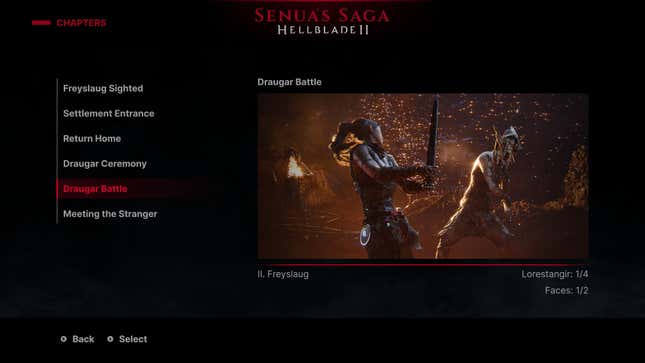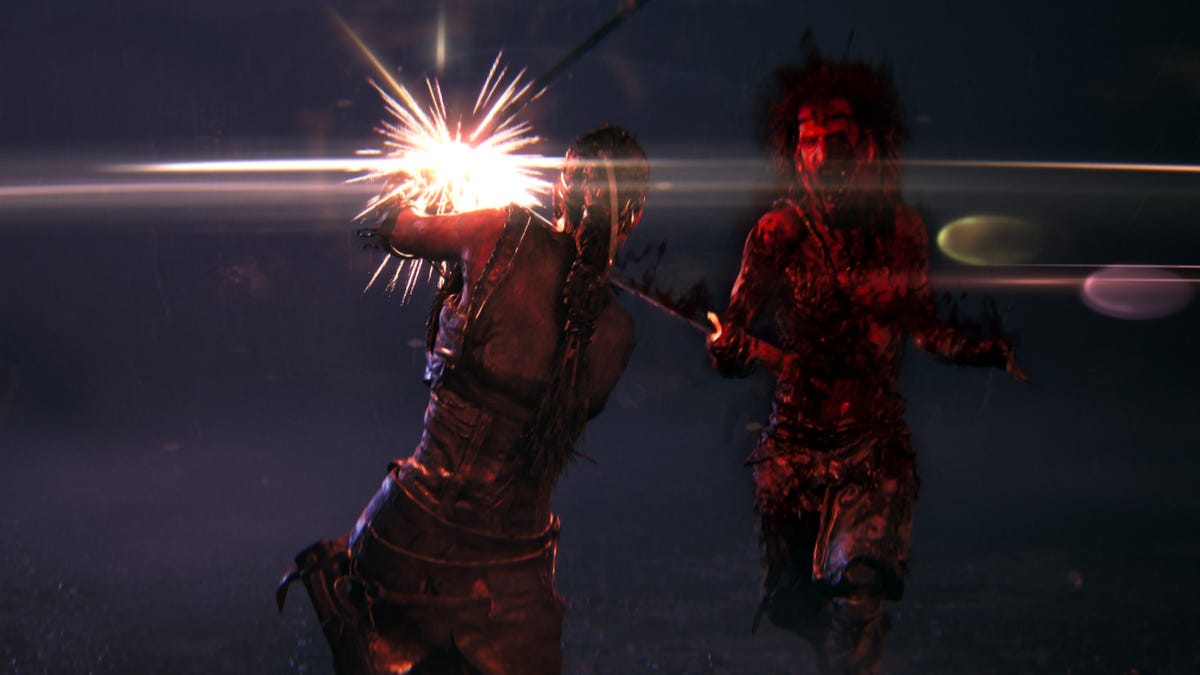Narrative action-adventure game Senua’s Saga: Hellblade II may have relatively simple combat compared to other action games, but that doesn’t mean it can’t be mastered. As I said in my review, the combat itself has a narrative feeling to it, with Senua’s successes or failures in battle feeling harmonious with the themes of struggle and perseverance explored in the plot. And yes, you can learn Hellbade’s relatively hard-to-read systems to come out on top in every battle.
Read More: Senua’s Saga: Hellblade II: The Kotaku Review
The game doesn’t communicate much about its combat—there’s no information conveyed to you via a HUD or lists of combos to review in a menu—so there might still be interesting movesets for players to discover in Hellblade II. Here’s what I’ve found so far when it comes to shaping Senua into the perfect warrior against the forces of darkness.
You can put the combat on auto-pilot
If you’re just here for the narrative and puzzle solving, you can either radically simplify the combat or put it entirely on auto-pilot, letting Senua do all the attacking and dodging on her own. Navigate to Settings > Gameplay > Accessibility and under Actions you’ll see Default, Simplified, and Self-play for both Offensive and Defensive actions, meaning you can either automate Senua’s attacks or her defenses, or both.
Read More: How To Make The Most Of Hellblade II’s Graphics On PC
This is a great way to simplify the game so you can focus on the story, OR to see the combat in action without your input.
Blocking and parrying basics
In Hellblade II, you want to be very active in blocking (as well as evading). Combat in this game is very much about paying attention to each individual opportunity to strike or prevent a strike—especially on the higher difficulties.
Holding RB/Ctrl will see Senua block attacks. This allows you to withstand most normal blows fairly well, but enemies have a few tricks up their sleeves and can find ways to break Senua’s stance. One example is when an enemy’s weapon glows red before they strike: While you can still block such an attack, it will knock you off balance, leaving you open.
However, if you block mere moments (and by moments, I mean milliseconds; the window to time this is incredibly small) before a strike hits, Senua will instead parry her enemy’s attack, which can leave them open for a fatal finisher from her. This includes the more powerful attacks where an enemy’s weapon glows red.
Evading is as essential as blocking
If you press A/Spacebar, Senua will take a step back. If you move and press A/spacebar, Senua will duck and move in the direction of your analog stick (or WASD input). This is the best way to deal with an enemy’s heavy attack (when their weapon glows red). You can also put some distance between you and a foe by holding back and hitting the evade button/key.
You can cancel attacks by evading and blocking
Canceling attacks is pretty important to the general flow of Hellblade II’s combat. Senua is perhaps most vulnerable while she’s in an attack animation that hasn’t yet landed its blow. Good news: blocking and evading cancels out an attack animation.
This is perhaps most important for heavy attacks. When an enemy is in a block stance (or using a shield), fast attacks won’t do a whole lot. You’ll need to land a heavy attack, the wind-up of which is rather slow. If you’re trying to land a heavy attack but see that an enemy is about to hit you before Senua finishes her attack animation, simply evade with a directional input and a press of A or spacebar and you’ll cancel out the heavy attack. You can also block with RB/Ctrl and cancel out attacks. (It’s hard to know for sure, but I seem to pull off successful parries more often by canceling out an attack with a block, so perhaps the parry window changes during a cancel).
You can also cancel out fast attacks (X/Left mouse button), but these are usually so swift that you won’t need to worry about it. Still, it’s worth keeping in mind.
Mash evade to get up or use Focus
If an enemy gets the better of you and knocks you to the ground, you have two ways to get back up. You can either mash the evade button (A/spacebar) or activate your Focus ability to get up quicker.
Evasion is the key to fire-breathers
Fire-breathing enemies are a bit of a pain in Saga as you can’t block flames. Instead, you’ll have to evade their bursts of fire with a directional input + the evade button/key. Fire-breathers attack to their left and right as well as to the front. The latter is the most disorienting as the camera doesn’t make it obvious how to steer clear. In general, moving back with directional input combined with Evade is the best way to avoid the flames.
You can sprint in combat too
If you’re trying to close the distance between Senua and the enemy quickly, sprinting will help. Holding LB or Shift while moving in combat will see Senua sprint forward. If you hit the attack button while sprinting during Senua’s Focus ability (RT/E), Senua will perform a leaping attack.
Don’t waste Senua’s Focus ability
Senua has a focus ability which slows down time and allows her to execute a number of rapid slashes. You’ll charge this ability by attacking, taking damage, and executing perfect parries.
But Focus isn’t a get-out-of-jail-free card for Senua. It is possible, particularly during the more challenging brawls, to miss your attacks while using this ability and you can also still be struck depending on an enemy’s stance. Also, if you activate it at a distance, make sure you’re sprinting forward to land a leaping attack on your enemy.
Senua’s Saga combat difficulty options explained
In Settings > Gameplay > Combat Difficulty, you’ll find four options which you can change at any time (including during fights). Just how Dynamic adjusts the difficulty is hard to discern for certain, but easy, normal, and hard seem to influence how many hits Senua can take before she’s knocked to the ground, where an enemy can easily execute a coup d’état. Based on my research (which I did by allowing the first enemy in the Draugar Fight to attack me), Senua would get sent to her downed state after the following number of attacks:
Easy: five strikes
Normal: four strikes
Hard: three strikes
It’s hard to tell exactly how difficulty affects the strength of Senua’s attacks. Without standard HUD elements like health bars and floaty numbers all over the place, we don’t have anything concrete to go on. That said, after running through the “Draugar Battle” a few times on different difficulties, I do feel like Senua’s able to chew through enemies a little faster on the easier difficulties
Where to practice combat

As soon as you start making progress in Hellblade II, you’ll gain access to chapter selection. This is a great way to practice Hellblade II’s combat for subsequent runs on hard mode if you so desire. After you rescue Fargrimr, you’ll have access to the “Draugar Battle” sequence which features about four to five minutes of fighting. You can skip the cutscene at the start of this sequence by pausing and selecting “Skip Cinematic” (let the scene play out just a second or two for this option to pop in the pause menu if it’s not there).
Read More: Hellblade II Studio Reportedly Already Working On Its Next Game
Starting from a specific chapter won’t override your current playthrough accessed by selecting “Continue” in the game’s main menu unless you play past the point where you last left off. So if you’ve played through chapters one through four, and go back to play chapter two, you won’t override your playthrough unless you progress through chapter four and on to chapter five.
Hellblade II is a game of mood and tone more than anything else. While it doesn’t contain long lists of combo moves or upgradable abilities and weapons, the combat is still very rewarding and energizing to play through once you get the hang of it.
.

